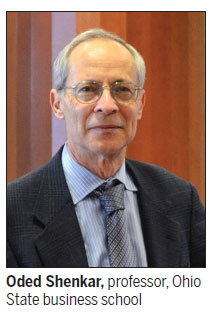China on threshold of global leadership: expert
Ohio State China authority looks to 19th Congress and beyond
What do you feel has been China's biggest achievement over the past five years? What's the most notable change you've observed?
Recalibration of the economy towards domestic consumption. This is a transition that many experts thought would be difficult if not impossible, but China has shown that it can transform its model, a critical capability for escaping the Middle Income Trap.
What three words would you use to describe China today?
Resurgent, reflective, transformative
What's the biggest challenge China faces, and how do you feel the country can go about overcoming this difficulty?
Achieving greater economic equity. This will require an even more radical reshuffling of the existing system, from healthcare to pensions, so as to encourage mobility, for instance by further transforming the hukou system.
What are your expectations for the 19th National Congress of the Communist Party of China? What are the key issues you care about most?
Because it comes at the midpoint of a strong administration, the congress is an opportunity for making fundamental changes.
The issues I care about: (1) China's opportunity to undertake a globally responsible leadership role, for instance, vis--vis North Korea and Iran. (2) The opportunity to develop the countryside. (3) The opportunity to transform China into a global climate leader. (4) Achieving the most important leadership role - moral leadership, by showing a good example both home and abroad.

What is your impression of President Xi Jinping?
He is obviously a very strong leader who is a strategic thinker.
How do you view China's role in today's world?
China has transitioned from an observer to having a voice in global affairs, but it has a long way to go before it becomes a global leader whose influence matches its economic power. China has a great opportunity to show moral and pragmatic global leadership by helping to achieve its own declared goal of denuclearization of the Korean Peninsula.
Do you believe that some of China's experiences or practices could be used to solve pressing global problems? If so, what are they?
Yes, of course. An example would be eradication of poverty and illiteracy in the developing world.
What do you think China will be like in five years' time? How do you view China's longer-term future?
In the next five years I expect more of the same, that is, economic growth and a very cautious and limited global engagement. I don't expect a radical change but rather more "crossing the river by feeling for stones". In the longer term, China is destined to restore its position as a world power. My hope is that it will also be a moral leader.
What's the most unforgettable experience or moment you've ever had in China, or related to China?
My first "aha moment" was when studying Chinese in the early 1970s and realizing that the dialogue we have learned was rooted in a 5,000-year history. That this was at the Hebrew University of Jerusalem in Israel, another millennia old civilization, gives it a special flavor and appreciation.
Note: Oded Shenkar is the Ford Motor Company Chair in Global Business Management and professor at the Fisher College of Business of Ohio State University. Shenkar and Simi Ronen are authors of the 2017 book Navigating Global Business: A Cultural Compass, published by Cambridge University Press.
chenweihua@chinadailyusa.com
(China Daily USA 10/24/2017 page10)












